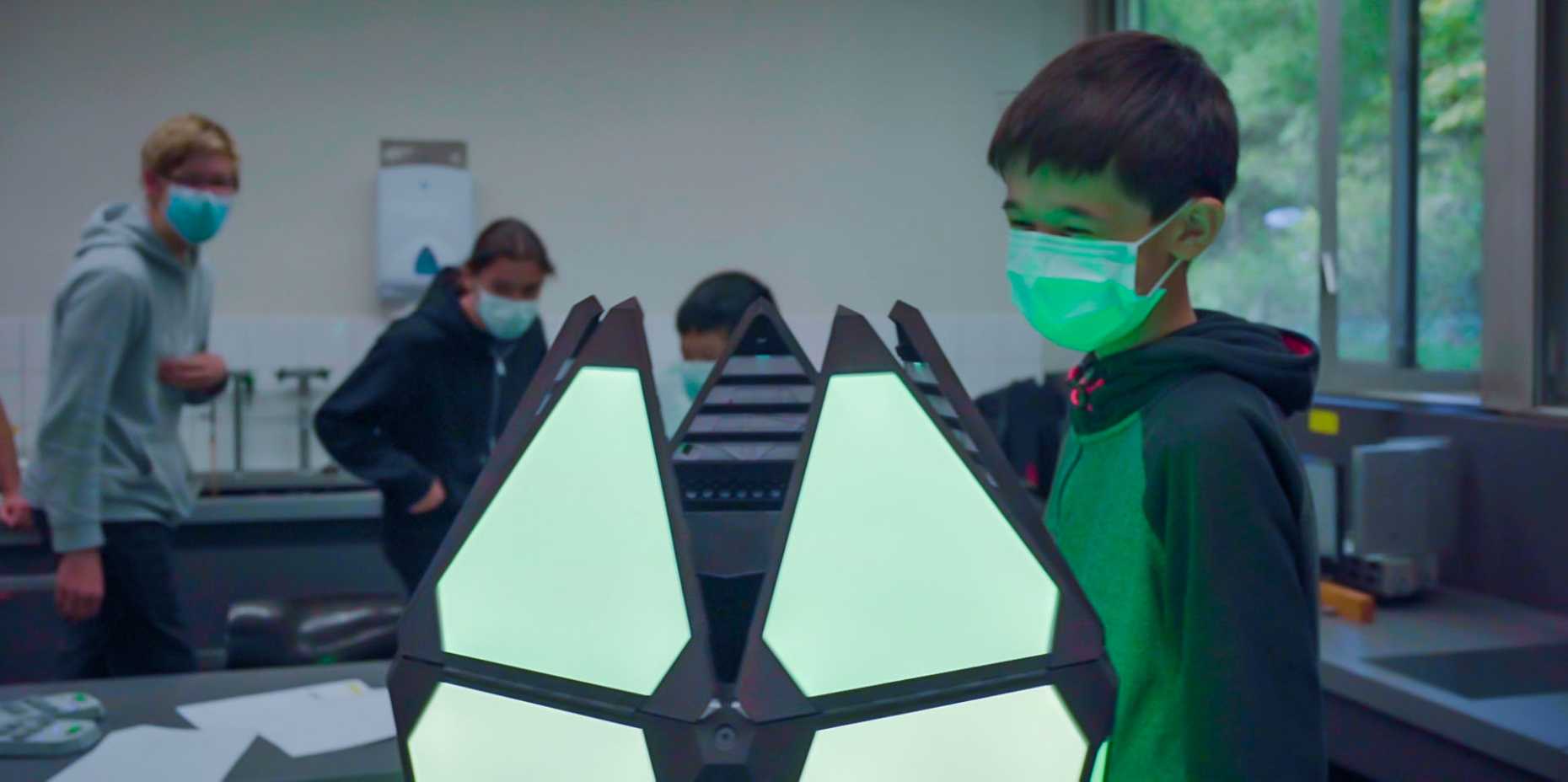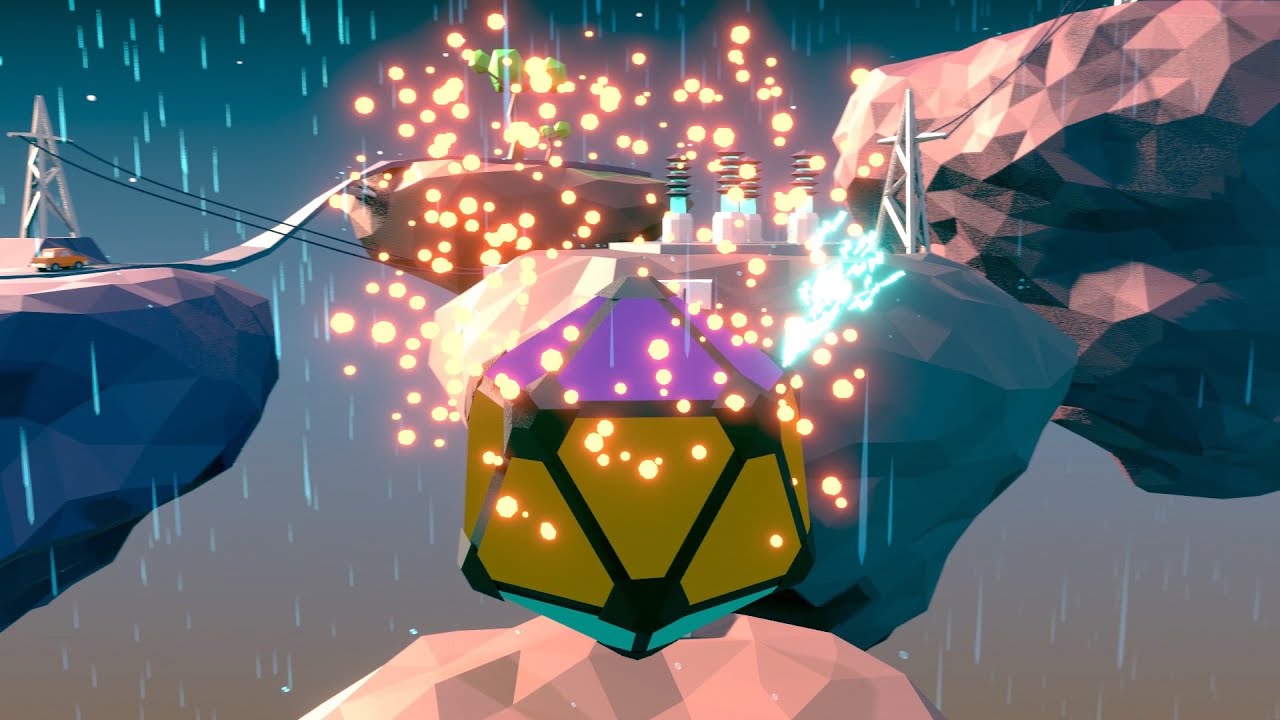Magic Cube: bringing electrical engineering to life
Magic Cube is a new teaching tool developed by ETH Zurich, ABB and mint & pepper. It uses a playful approach to teach junior high and high school students the basics of electrical engineering and awaken their interest in the field.

"Before using Magic Cube, nothing really came to mind when hearing about electrical engineering, even though it's actually an integral part of our everyday lives." This testimonial comes from a female student at MNG R?mibühl, a math and science high school where the Magic Cube had its first trial run in the classroom in mid-October of this year. This new teaching tool was developed by ETH Zurich, tech giant ABB, and youth outreach project mint & pepper (an initiative of Wyss Zurich, which is jointly run by ETH Zurich and University of Zurich).
Coming to a standstill
It all begins with a storm: lightning strikes inside of the mysterious geometric entity known as the Magic Cube, causing a power outage in a fictional world called Elektron. It's a total blackout, with everything coming to a standstill, from factories and solar vehicles to microscopes and street lamps.
After being introduced to this scenario in a short film, students work through specific hands-on exercises in the classroom in order to help the citizens of Elektron. They have to answer fundamental questions in the process: What is an electronic circuit? How does energy get converted, distributed and stored? What are sensors used for? Once a team has successfully completed a module, individual panels of the Magic Cube light up – a visible sign of their progress in the game. And once all teams find the right answers, the entire cube glows and then opens up: Elektron has been rescued, and there is a surprise for all participants.

A different approach to learning
A lot needs to happen before the Magic Cube starts to work again. Students engage in discussions, tinker with solutions, work out fundamental principles, carry out tests, write programs for processes – and share a few laughs along the way. To work their way through the Magic Cube modules, students have to connect consumers to the power supply in a smart grid, program a sorting process for a factory, construct a rail network and speed regulation system for trains, control a car via a brain-computer interface, and build a bridge using a robot.
In the electric vehicle module, students help a car navigate a predefined route using solar energy. This requires them not only to calculate the energy requirements but also to determine the driving time: to do so, they have to consider the solar cell circuit design as well as the gear they are driving in.
In another fun module, students build their own microscope in order to identify samples, adjusting the lenses, setting up the lighting and connecting it to a camera chip.
Developing young people's interest in electrical engineering
There's a clear idea that inspired the development of Magic Cube: the goal is to help young people build confidence in their technical skills, thereby awakening their enthusiasm for technical tinkering and problem solving. Young women in particular underestimate their skills in mathematics and technical subjects, which later leads to fewer women considering STEM fields than their male counterparts. "It's great to see how enthusiastic students are about the lessons and how eager they are to tackle the assignments together," says Axelle Krayenbühl-Tapponnier, a teacher at MNG R?mibühl. "They are learning critical fundamentals of electrical engineering and physics, but they're having so much fun that it's almost an afterthought. It's a really great way to enrich our lessons."
A new teaching tool
Magic Cube is a new educational resource for teachers of natural sciences and technical subjects. Its methods and didactic approach are tailored to meet the requirements of Lehrplan 21, a curriculum harmonisation project for German-speaking Switzerland. The first ideas for the captivating cube were developed jointly by the Department of Information Technology and Electrical Engineering (D-ITET) and trainees from ABB. Both ABB and ETH Zurich have a stake in the development of talented students. "As home to many high-tech firms and institutions, Switzerland needs to have a pool of well-educated specialists, especially when considering the great challenges of our time like climate change and digitalisation," says Nicole Kamm, HR manager for ABB Switzerland. "This is why we need to have clear messaging about how multifaceted the world of electrical engineering is and how useful this field is for society," adds Christian Franck, Professor of High Voltage Engineering at D-ITET. "By using Magic Cube in the classroom, we'll come one step closer to this goal."
The next generation of talent
Mint & pepper, the youth outreach project of Wyss Zurich (a joint centre of ETH Zurich/University of Zurich), was the ideal partner for rounding out D-ITET's expertise in research and ABB's practical expertise in mobility, infrastructure and industrial technology. The mint & pepper team knows how to create materials for experiential learning and is also responsible for getting the Magic Cube materials into the hands of educators. Mint & pepper oversaw the technical and didactic development of the project as well, giving the Magic Cube both its name and its magical properties. ETH students and pedagogical experts worked together to create complex technical and scientific content for the modules, ensuring that the lessons are age-appropriate, engaging and robust – and can be implemented at low cost.
Available starting in February 2021
Featuring 12 different electrical engineering modules, Magic Cube will be available for use in schools and extracurricular activities starting in February 2021. Educators can already make reservations for the next semester. Magic Cube is suitable for 12- to 15-year-olds and can be used in classrooms or groups of up to 24 students. ETH students and ABB trainees receive coaching from mint & pepper and then deliver the lessons on site, teaching the technical background and helping students find the right answers. They also share their enthusiasm for their field and can give younger students practical advice and insights about their chosen careers. In this way, maybe they can inspire some of the next generation to follow in their footsteps.
Demonstration at the Swiss Digital Days event
external page The Magic Cube and the rescue of Elektron – a world premiere, Sunday, 1 November, 5.40 – 6.00 p.m.; join the live online session at this external page link.